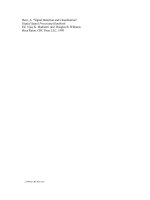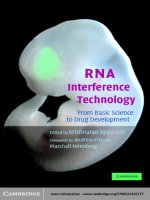Safety signal detection from vietnamese spontaneous adverse drug reaction reporting system for several high cost drugs covered by vietnam health insurance fund (tt)
Bạn đang xem bản rút gọn của tài liệu. Xem và tải ngay bản đầy đủ của tài liệu tại đây (532.56 KB, 5 trang )
Toulouse III Paul Sabatier University
Faculty of Pharmaceutical Sciences
Master 2 specializing in “Pharmacological innovation and medical drug positions”
Internship report
Safety signal detection from Vietnamese spontaneous
adverse drug reaction reporting system for
several high-cost drugs covered by
Vietnam health insurance fund
Carried out at
the National Drug Information and Adverse Drug Reactions Monitoring Center,
Vietnam
03/2018 – 08/2018
VO Thi Thuy Kieu
Practical supervisors
NGUYEN Hoang Anh, director, the National DI and ADR Monitoring Center, Vietnam
NGUYEN Hoang Anh, specialist, the National DI and ADR Monitoring Center, Vietnam
Academic supervisor
Anne ROUSSIN,
Professor, Pharmacology, Faculty of Pharmacy, Toulouse
Academic year 2017 - 2018
Acknowledgements
I would like to send a big thank you to all people who contributed to my internship’s success and
helped me with the report writing.
First of all, I would like to thank the entire Paul Sabatier University teaching team, especially Prof.
Anne ROUSSIN, for supporting me by theoretical lessons. This valuable knowledge is extremely
useful for my internship.
I also would like to express my gratitude to Professor NGUYEN Hoang Anh, the director of the
National Drug Information and Adverse Drug Reactions Monitoring Center, for giving me a golden
opportunity to perform the internship at the center, and more importantly for his enthusiastic
encouragements and precious instructions during my internship period.
Then, I am extremely grateful to Pharm. NGUYEN Hoang Anh, specialist of the National Drug
Information and Adverse Drug Reactions Monitoring Center, for useful instructions during the past
six months. He gave me extensive guidance regarding many practical issues. Furthermore, he
offered very constructive feedback on my research as well as helped me to organize my
presentation.
Besides, I thank all the staffs at the National Drug Information and Adverse Drug Reactions
Monitoring Center allowing me to gain a better insight into the overview of Pharmacovigilance
System in Vietnam.
I also thank the Pierre Fabre Foundation, the Francophone University Agency, who gave me
financial support within ten months.
Finally, I want to say thank you to my big family who has been my motivation for the past
academic year.
List of Tables
Table 1. Two-by-two contingency table for a combination “drug X” (or “drug of interest”) and
“ADR Y” (or “ADR of interest”) and framework for the calculation of the disproportionality ......... 2
Table 2. The number and percentage of reports with several noticeable ADRs.................................. 7
Table 3. ROR for medications generated noticeable ADR signals in the period 2010 – 2016 ........... 9
Table 4. Comparison of signals for investigated drugs in NPDV with VigiBase .............................. 10
List of Figures
Figure 1. Overview of pharmacovigilance process .............................................................................. 1
Figure 2. The number of ADR reports from healthcare units per year ................................................ 5
Figure 3. The number and percentage of ADR reports relating to investigated drugs ........................ 5
Figure 4. Distribution of ADR reports by SOC ................................................................................... 6
List of Abbreviations
ADR
AGEP
ART
BCPNN
DRESS
Adverse Drug Reaction
Acute Generalized Exanthematous Pustulosis
Adverse Reaction Terminology
Bayesian Confidence Propagation Neural Network
Drug Reaction with Eosinophilia and Systemic Symptoms
IC
MGPS
NDIADRMC
NPDV
PRR
PT
Information Component
Multi-item Gamma Poisson Shrinker
National Drug Information & Adverse Drug Reaction Monitoring Center
National Pharmacovigilance Database of Vietnam
Proportional Reporting Ratio
Preferred Term
ROR
SCAR
Reporting Odds Ratio
Serious Cutaneous Adverse Reaction
SJS
SOC
Stevens-Johnson syndrome
System Organ Class
SPC
TEN
UMC
WHO
Summary of Product Characteristics
Toxic Epidermal necrolysis
Uppsala Monitoring Center
World Health Organization
Abstract
Background Irrational drug use causes many significant problems such as waste of money,
uneffective treatment, an increase in the number of patients with ADRs. In the specific sociological
context of Vietnam, the study aims to describe and quantify the noticeable ADRs relating to 41
high-cost drugs in the list of drugs of Vietnam health insurance fund using the National
Pharmacovigilance Database of Vietnam.
Methods Spontaneous reporting of adverse drug reactions (ADRs) recorded in the period of 2010 –
2016 were retrospectively analysed to identify reports of 41 high-cost drugs. Characteristics of
ADR reports relating to these drugs were described. Disproportionality analysis was used for
signals generation.
Results Of the 38,521 ADR reports from healthcare units in the period of 2010 – 2016, 36,792
reports had ADR causality for suspected drugs. ADR reports of 40/41 drugs in the list were
recorded except for glycyrrhizin/glycine/L-cysteine combination. Reports relating to antibiotics,
especially cephalosporins were predominant. In addition to high-risk agents which were widely
known causing anaphylaxis such as β-lactams and anti-cancer agents (paclitaxel, oxaliplatin), there
were some important signals relating to methylprednisolone (ROR= 1.98 [1.03-3.78]), piracetam
(ROR= 2.26 [1.34-3.82]), chymotrypsin (ROR= 1.70 [1.25-2.31]), glutathione (ROR= 4.02 [1.828.85]) and L-ornithine L-aspartate (ROR= 1.80 [1.11-2.92]). Ciprofloxacin and levofloxacin had
significantly high incidence rates of application site reactions, which were 23.4%, ROR= 14.77
[12.78-17.08] and 23.8%, ROR= 12.83 [10.73-15.34] respectively. SCAR signals relating to
cefixime (ROR= 7.58 [4.08-14.07]) and paracetamol (ROR= 3.46 [2.31-5.17]), and arthralgia,
hepatitis signals relating to levofloxacin (ROR= 3.89 [2.09-7.22] and 2.72 [1.19-6.22] respectively)
were also generated.
Conclusion In spite of some limitations of spontaneous ADR reporting system, the finding released
necessary results for drug safety in specific context of Vietnam. This study also confirmed that
routine analysis of database plays an essential role in timely identifying potential risks as well as
providing proper management and enhancing effective communication.
Table of contents
1. Introduction .......................................................................................................................1
2. Materials and methods .......................................................................................................3
2.1. Describe the characteristics of ADR reports relating to 30 drugs with the highest cost in
2016 and 11 drugs used for adjuvant purposes covered by Vietnam health insurance fund . 3
2.2. Generate safety signals of these 41 drugs from NPDV in the period 2010 – 2016 ............... 4
3. Results ...............................................................................................................................5
3.1. Describe the characteristics of ADR reports relating to 30 drugs with the highest cost in
2016 and 11 drugs used for adjuvant purposes in the Vietnam health insurance
expenditures ........................................................................................................................... 5
3.1.1.
The number of ADR reports from healthcare units per year ......................................... 5
3.1.2.
The number and percentage of ADR reports relating to investigated drugs ................. 5
3.1.3.
Characteristics of ADRs by SOC and PT ...................................................................... 6
3.2. Generate safety signals of these 41 drugs from NPDV in the period of 2010 – 2016 ........... 8
3.2.1.
Several important signals of investigated drugs in NPDV in the period 2010 – 2016 .. 8
3.2.2.
Comparison of signals for investigated drugs in NPDV with VigiBase ...................... 10
4. Discussion ........................................................................................................................10
4.1. Characteristics of ADR reports relating to 30 drugs with the highest cost in 2016 and 11
drugs used for adjuvant purposes ......................................................................................... 11
4.2. Safety signals of 41 investigated drugs from NPDV in the period 2010 – 2016 ................. 11
4.2.1.
Anaphylactic signals .................................................................................................... 11
4.2.2.
Signals of application site reactions ............................................................................ 13
4.2.3.
SCAR signals ................................................................................................................ 13
4.2.4.
Other noticeable signals .............................................................................................. 14
5. Conclusion .......................................................................................................................14
References ..............................................................................................................................15
APPENDIX ............................................................................................................................19









